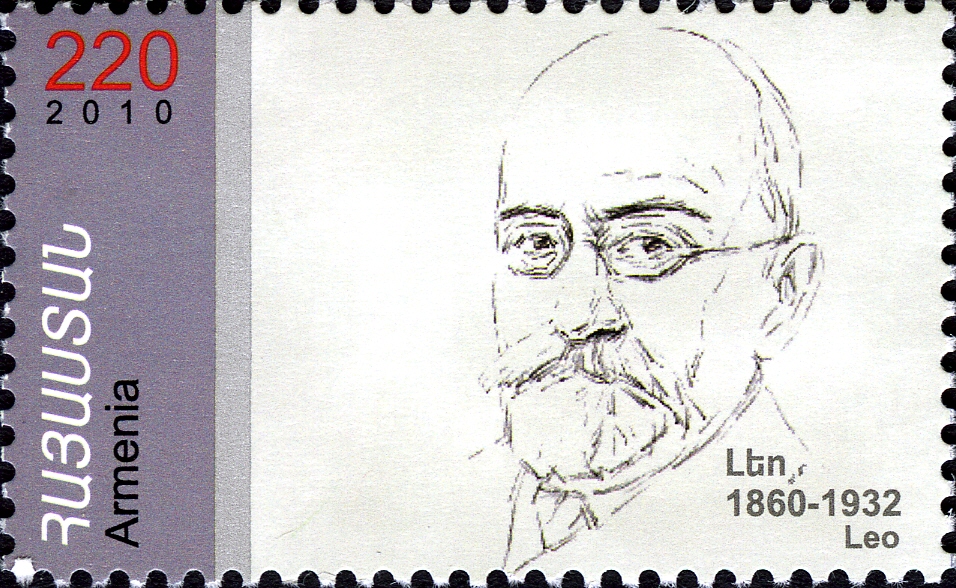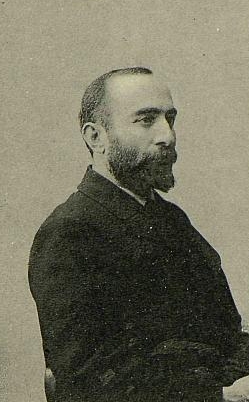|
Leo (historian)
Arakel Grigori Babakhanian ( hy, Առաքել Գրիգորի Բաբախանյան; – 14 November 1932), commonly known by his pen name Leo ( hy, Լեո), was an Armenian historian, writer, critic and professor of Yerevan State University. He is best known for authoring a multi-volume work on the history of Armenia. Leo adopted a critical stance in examining some of the most important issues in Armenian history, literature and contemporary problems of the early 20th century. Harutyunian, Sh. R. and A. K. Ohanian. s.v.Leo" Armenian Soviet Encyclopedia. Yerevan: Armenian Academy of Sciences, 1978, vol. 4, pp. 566-567. Biography Leo was born on 14 April 1860 in the city of Shusha/Shushi in the region of Mountainous Karabakh, then a part of the Russian Empire. He was one of several children of Grigor Babakhanian, a tailor (later bellringer) of modest means. He graduated from the local school there in 1878. Due to the death of his father in 1879, Leo was unable to attend univers ... [...More Info...] [...Related Items...] OR: [Wikipedia] [Google] [Baidu] |
Shusha
/ hy, Շուշի , settlement_type = City , image_skyline = ShushaCollection2021.jpg , image_caption = Landmarks of Shusha, from top left:Ghazanchetsots Cathedral • Yukhari Govhar Agha MosqueShusha fortress • Shusha mountainsHouse of Mehmandarovs • City centerShusha skyline • House of Khurshidbanu Natavan , pushpin_map = Azerbaijan#Republic of Artsakh , coordinates = , subdivision_type = Country , subdivision_name = Azerbaijan Republic of Artsakh (claimed) , subdivision_type1 = District (Azerbaijan) , subdivision_name1 = Shusha , subdivision_type2 = Province (Artsakh, claimed) , subdivision_name2 = Shushi , established_title = Founded , leader_title1 = Mayor , leader_name1 = Bayram Safarov , leader_title2 ... [...More Info...] [...Related Items...] OR: [Wikipedia] [Google] [Baidu] |
Mshak
''Mshak'' ( hy, Մշակ meaning ''The Toiler'') was an Armenian language literary and political daily newspaper ( weekly when established) published from 1872–1920 in Tiflis, Russian Empire (now Tbilisi, Georgia). It was founded by Grigor Artsruni. ''Mshak'' was famous particularly for its serialization of notable Armenian literary works, such as '' Jalaleddin''. ''Mshak'' was also known for its publication of liberal ideas, promoting the creation of a united Armenian state inside the Russia. In 1921, after the Soviet invasion of Georgia, ''Mshak'', along with other anti-Bolshevik media, was closed. Editors The following is the list of the editors of ''Mshak'': See also *Armenians in Tbilisi *Armenian literature Armenian literature begins around AD 400 with the invention of the Armenian alphabet by Mesrop Mashtots. History Early literature Only a handful of fragments have survived from the most ancient Armenian literary tradition preceding the Christia ... Referen ... [...More Info...] [...Related Items...] OR: [Wikipedia] [Google] [Baidu] |
Great Soviet Encyclopedia
The ''Great Soviet Encyclopedia'' (GSE; ) is one of the largest Russian-language encyclopedias, published in the Soviet Union from 1926 to 1990. After 2002, the encyclopedia's data was partially included into the later ''Bolshaya rossiyskaya entsiklopediya'' (or '' Great Russian Encyclopedia'') in an updated and revised form. The GSE claimed to be "the first Marxist–Leninist general-purpose encyclopedia". Origins The idea of the ''Great Soviet Encyclopedia'' emerged in 1923 on the initiative of Otto Schmidt, a member of the Russian Academy of Sciences. In early 1924 Schmidt worked with a group which included Mikhail Pokrovsky, (rector of the Institute of Red Professors), Nikolai Meshcheryakov (Former head of the Glavit, the State Administration of Publishing Affairs), Valery Bryusov (poet), Veniamin Kagan (mathematician) and Konstantin Kuzminsky to draw up a proposal which was agreed to in April 1924. Also involved was Anatoly Lunacharsky, People's Commissar of Education ... [...More Info...] [...Related Items...] OR: [Wikipedia] [Google] [Baidu] |
Andrei Bitov
Andrei Georgiyevich Bitov (russian: Андре́й Гео́ргиевич Би́тов, 27 May 1937 – 3 December 2018) was a prominent Russian writer of Circassian ancestry. Biography Bitov was born in Leningrad. His father was an architect and his mother was a lawyer. He completed his secondary education in 1954 and began writing two years later. In 1957, he became a student at the Leningrad Mining Institute. While there, he joined a literary association for young writers led by . He also served with a in the north and graduated in 1962. He then began writing poetry and short, absurdist stories which were not published until the 1990s. In 1965, he became a member of the Union of Soviet Writers. By 1978, he had published ten works, but his now best known work, ''Pushkin House'', had to be published in the United States and did not appear in the USSR until two years after the beginning of Perestroika. In 1988, he was one of the founders of the Russian PEN Club and was its Pr ... [...More Info...] [...Related Items...] OR: [Wikipedia] [Google] [Baidu] |
Armenia
Armenia (), , group=pron officially the Republic of Armenia,, is a landlocked country in the Armenian Highlands of Western Asia.The UNbr>classification of world regions places Armenia in Western Asia; the CIA World Factbook , , and ''Oxford Reference Online'' also place Armenia in Asia. It is a part of the Caucasus region; and is bordered by Turkey to the west, Georgia to the north, the Lachin corridor (under a Russian peacekeeping force) and Azerbaijan to the east, and Iran and the Azerbaijani exclave of Nakhchivan to the south. Yerevan is the capital, largest city and the financial center. Armenia is a unitary, multi-party, democratic nation-state with an ancient cultural heritage. The first Armenian state of Urartu was established in 860 BC, and by the 6th century BC it was replaced by the Satrapy of Armenia. The Kingdom of Armenia reached its height under Tigranes the Great in the 1st century BC and in the year 301 became the first state in the world to adopt ... [...More Info...] [...Related Items...] OR: [Wikipedia] [Google] [Baidu] |
Sovietization
Sovietization (russian: Советизация) is the adoption of a political system based on the model of soviets (workers' councils) or the adoption of a way of life, mentality, and culture modelled after the Soviet Union. This often included adopting the Latin or Cyrillic script, and sometimes also the Russian language. Itself, the term Soviet as a form of self-organization that arose during the 1905 Russian Revolution was positive in nature being associated with equality, justice, democracy. However, during the revolutionary period of late 1917 and the Bolshevik coup-d'état, the soviets went through transformation known in history as bolshevization of the Soviets during which Bolsheviks or "the Reds" became the leading force in this movement of self-organization. Bolshevization of the Soviets led to situation of " Dual power" in the post-Tsarist Russia where "the Reds was fighting the Contra". Since then, the term has been associated exclusively with communism and the Bols ... [...More Info...] [...Related Items...] OR: [Wikipedia] [Google] [Baidu] |
Arakel Babakhanyan
Arakel or Aragel, an Armenian given name. It means "To send" in Armenian. With the addition of -ian, it is also a common surname as Arakelyan / Arakelian. Arakel or Aragel may refer to: Places * Arakel, Karabakh, a village in the Khojavend Rayon of Azerbaijan and Hadrut Province of the Nagorno-Karabakh Republic Persons *Aragel, catholicos of Caucasian Albanian diocese of the Armenian church from 1481 to 1497 *Arakel of Tabriz or Arakel Davrizhetsi (1590s-1670), 17th-century Persian-Armenian historian *Arakel Babakhanian (commonly known as Leo) (1860–1932), Armenian historian, publicist, writer, critic and professor * Arakel Mirzoyan (born 1989), Armenian weightlifter *Arabo Arabo ( hy, Արաբօ, 1863–1893), born Arakel Mkhitarian, was an Armenian fedayi of the late 19th century. Arabo was born in the village of Kurter or Korter ( or ) in the region of Sasun in the Bitlis vilayet. Arabo studied at the Arakel ... (1863–1893), also known as Arakel, an Armenian fedayi ... [...More Info...] [...Related Items...] OR: [Wikipedia] [Google] [Baidu] |
Trabzon
Trabzon (; Ancient Greek: Tραπεζοῦς (''Trapezous''), Ophitic Pontic Greek: Τραπεζούντα (''Trapezounta''); Georgian: ტრაპიზონი (''Trapizoni'')), historically known as Trebizond in English, is a city on the Black Sea coast of northeastern Turkey and the capital of Trabzon Province. Trabzon, located on the historical Silk Road, became a melting pot of religions, languages and culture for centuries and a trade gateway to Persia in the southeast and the Caucasus to the northeast. The Venetian and Genoese merchants paid visits to Trabzon during the medieval period and sold silk, linen and woolen fabric. Both republics had merchant colonies within the city – Leonkastron and the former "Venetian castle" – that played a role to Trabzon similar to the one Galata played to Constantinople (modern Istanbul). Trabzon formed the basis of several states in its long history and was the capital city of the Empire of Trebizond between 1204 and 1461. Durin ... [...More Info...] [...Related Items...] OR: [Wikipedia] [Google] [Baidu] |
Transcaucasian Democratic Federative Republic
The Transcaucasian Democratic Federative Republic (TDFR; (), (). 22 April – 28 May 1918) was a short-lived state in the Caucasus that included most of the territory of the present-day Armenia, Azerbaijan and Georgia, as well as parts of Russia and Turkey. The state lasted only for a month before Georgia declared independence, followed shortly after by Armenia and Azerbaijan. The region that formed the TDFR had been part of the Russian Empire. As the empire dissolved during the 1917 February Revolution and a provisional government took over, a similar body, called the Special Transcaucasian Committee (Ozakom), did the same in the Caucasus. After the October Revolution and rise of the Bolsheviks in Russia, the Transcaucasian Commissariat replaced the Ozakom. In March 1918, as the First World War continued, the Commissariat initiated peace talks with the Ottoman Empire, which had invaded the region, but that broke down quickly as the Ottomans refused to accept ... [...More Info...] [...Related Items...] OR: [Wikipedia] [Google] [Baidu] |
Armenian Populist Party
The Armenian Populist Party ( hy, Հայ Ժողովրդական Կուսակցություն) was a political party founded in March 1917 in Russian Armenia. Its members had previously belonged to the Russian Kadet party. The Populists had a liberal programme and drew their support from middle-class Armenians in Tbilisi and Baku. History The Populists had 43 of the 204 representatives in the Armenian National Congress of October 1917 and two of the 15 seats in the subsequent Armenian National Council.Hovannisian, p.18 footnote See also * Programs of political parties in Armenia * Politics of Armenia The politics of Armenia take place in the framework of the parliamentary representative democratic republic of Armenia, whereby the President of Armenia is the head of state and the Prime Minister of Armenia the head of government, and of a mul ... References Sources *Richard G. Hovannisian ''The Republic of Armenia: The First Year 1918-19'' (University of California, 1971) ... [...More Info...] [...Related Items...] OR: [Wikipedia] [Google] [Baidu] |
Dashnaktsutyun
The Armenian Revolutionary Federation ( hy, Հայ Յեղափոխական Դաշնակցութիւն, ՀՅԴ (Classical Armenian orthography, classical spelling), abbr. ARF or ARF-D) also known as Dashnaktsutyun (collectively referred to as Dashnaks for short), is an Armenian nationalist and socialist political party founded in 1890 in Tiflis, Russian Empire (now Tbilisi, Georgia (country), Georgia) by Christapor Mikaelian, Stepan Zorian, and Simon Zavarian. Today the party operates in Armenia, Artsakh Republic, Artsakh, Lebanon, Iran and in countries where the Armenian diaspora is present. Although it has long been the most influential political party in the Armenian diaspora, it has a comparatively smaller presence in modern-day Armenia. As of October 2021, the party was represented in three national parliaments with ten seats in the National Assembly of Armenia, three seats in the National Assembly (Artsakh), National Assembly of Artsakh and three seats in the Parliament of Leb ... [...More Info...] [...Related Items...] OR: [Wikipedia] [Google] [Baidu] |




